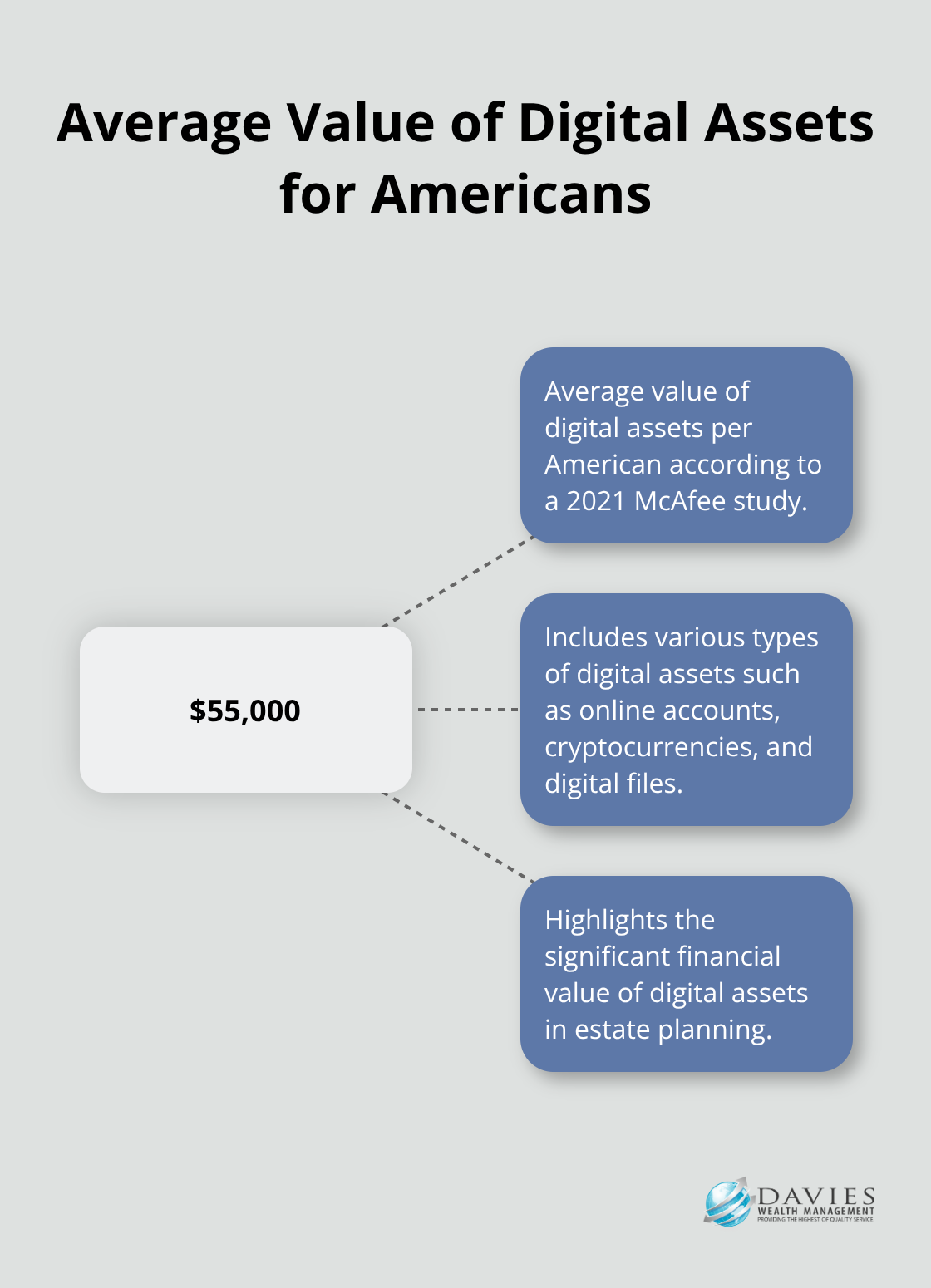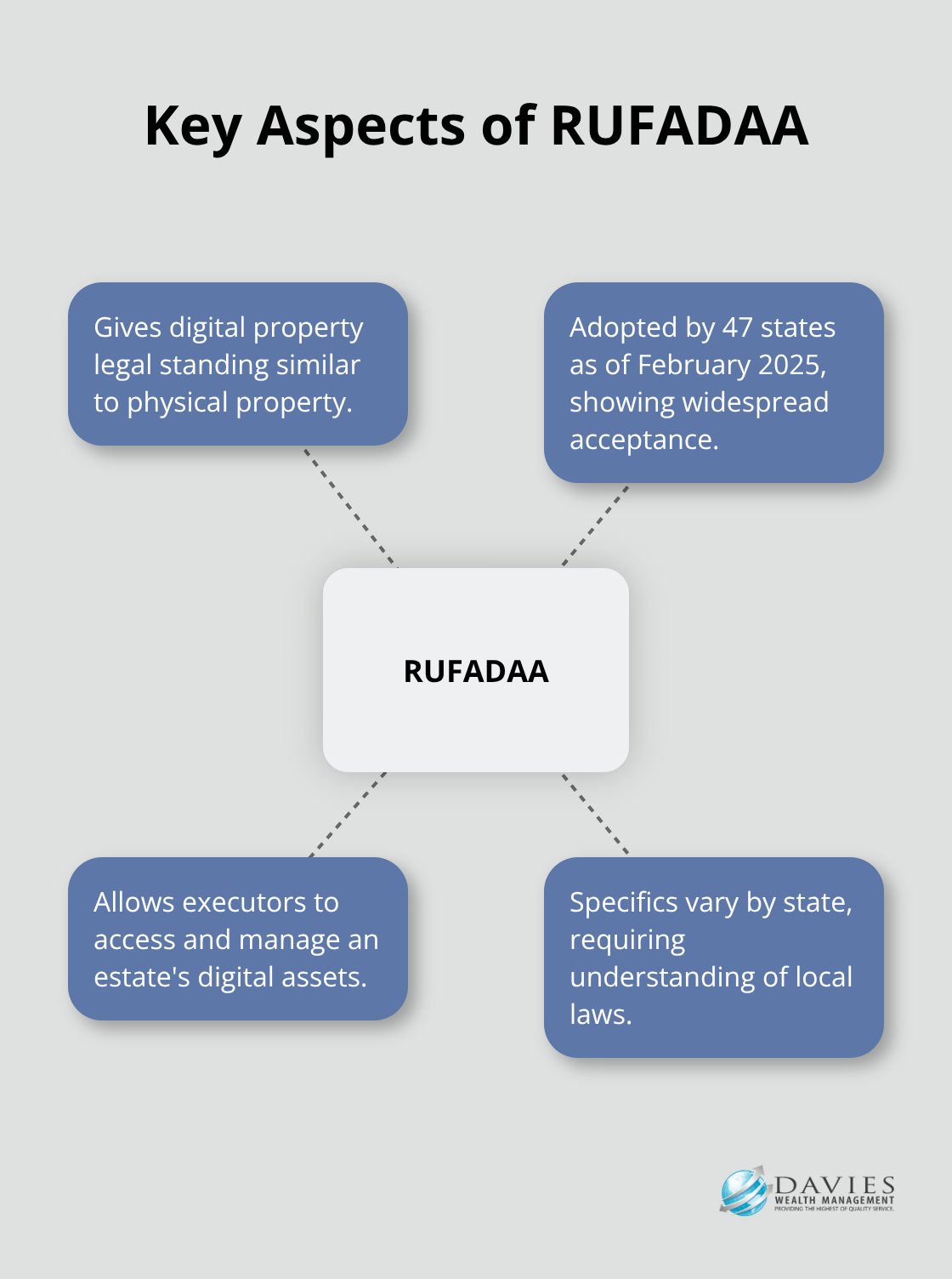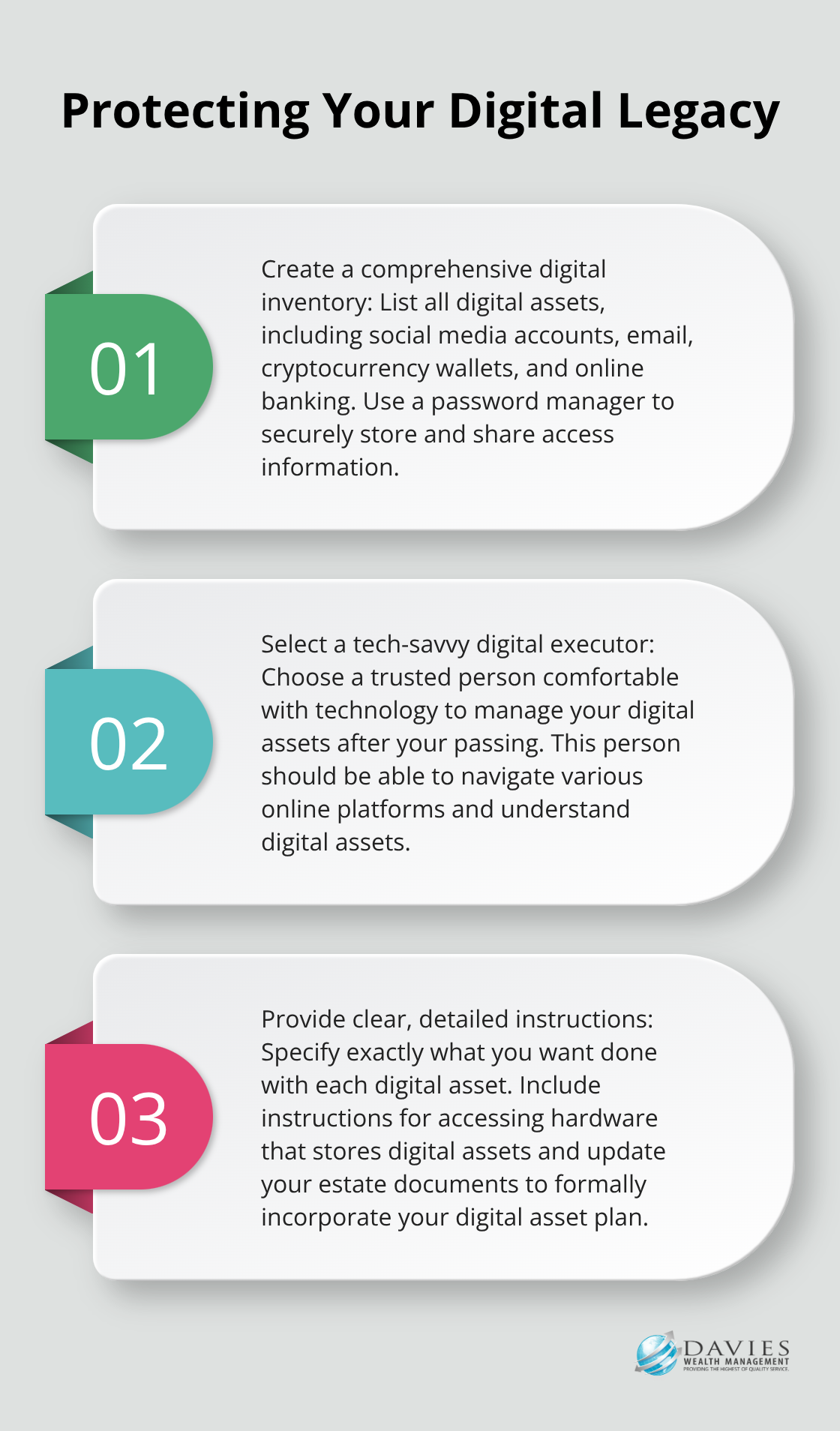In today’s digital age, our lives are increasingly intertwined with online accounts, cryptocurrencies, and digital files. These digital assets hold significant value, both financial and sentimental, yet they’re often overlooked in traditional estate planning.
At Davies Wealth Management, we understand the importance of incorporating digital assets and estate planning into your overall financial strategy. This comprehensive guide will walk you through the essential steps to protect and transfer your digital legacy, ensuring your loved ones can access and manage these assets according to your wishes.
What Are Digital Assets?
Defining Digital Assets
Digital assets include any content, account, or file stored on a computer or in the cloud. These assets range from social media profiles and email accounts to cryptocurrency wallets and online banking information. Even your collection of digital photos and videos fall under this category.
Types of Digital Assets
The digital asset landscape continues to expand. Cryptocurrencies (like Bitcoin and Ethereum) have become increasingly popular and valuable. Online accounts (such as PayPal or Amazon) often hold substantial balances. Digital files encompass important documents, cherished photos, and intellectual property (e.g., blog posts or digital artwork).
Financial Value of Digital Assets
The financial value of digital assets can be substantial. A 2021 study by McAfee found that the average American values their digital assets at $55,000. For professional athletes and high-net-worth individuals, this figure can skyrocket, especially when considering cryptocurrency investments and monetized social media accounts.

Legal Considerations
The Revised Uniform Fiduciary Access to Digital Assets Act (adopted by 47 states as of February 2025) gives digital property legal standing similar to physical property. Without explicit instructions, your digital assets could become lost or inaccessible to your beneficiaries.
Importance in Estate Planning
Including digital assets in your estate plan is now essential. Without proper planning, your heirs may face significant challenges accessing or inheriting these assets. At Davies Wealth Management, we’ve worked with clients whose digital assets range from a few thousand dollars to several million. In one instance, a client’s cryptocurrency holdings appreciated by 500% in just two years, dramatically altering their estate’s value.
This underscores the need to regularly update your estate plan to reflect the changing nature and value of your digital assets. As we move forward, let’s explore the specific legal considerations that come into play when planning for the future of your digital assets.
Navigating the Legal Landscape of Digital Assets
Federal and State Legislation
The Revised Uniform Fiduciary Access to Digital Assets Act (RUFADAA) forms the foundation of digital asset legislation in the United States. Under RUFADAA, a Decedent’s Executor or Trustee can access and manage an Estate’s digital assets and electronic communications. However, the specifics vary by state, making it essential to understand your local laws.

In California, for example, the law permits the disclosure of electronic communications to a designated fiduciary only if the user consented to such disclosure. Without explicit permission in your estate plan, your executor may not access your email or social media accounts.
Platform Terms of Service
One of the biggest obstacles in digital asset estate planning involves the terms of service agreements of various online platforms. These agreements often protect user privacy, which can create unintended barriers for executors.
Facebook’s legacy contact feature allows you to choose someone to look after your account if it’s memorialized, but this person won’t have full access to your private messages. Google’s Inactive Account Manager lets you decide what happens to your data after a period of inactivity, but it doesn’t automatically grant access to your executor.
Challenges in Ownership Transfer
The transfer of digital asset ownership presents unique challenges. Cryptocurrencies, for instance, require access to private keys or seed phrases. Without proper documentation and secure storage, these assets could become permanently inaccessible. Some clients have implemented multi-signature wallets (requiring two or more keys to access funds) as a safeguard against loss.
Digital content such as music, e-books, and movies often come with licensing agreements that prohibit ownership transfer. While you can bequeath your physical book collection, your Kindle library may not be transferable to your heirs.
Practical Steps for Legal Compliance
To navigate these legal complexities, we recommend the following:
- Create a comprehensive digital asset inventory (including account details and access information).
- State your wishes for each digital asset explicitly in your will or trust.
- Use online tools provided by platforms like Google and Facebook to set up legacy contacts or inactive account managers.
- Consider using a password manager to store and share access information securely with your designated digital executor.
- Review and update your digital asset plan regularly, as laws and platform policies change frequently.
The Role of Professional Guidance
The intricate nature of digital asset laws and policies underscores the importance of professional guidance. Financial advisors with expertise in digital asset estate planning can help you create a comprehensive strategy that aligns with current laws and best practices. They can also assist in keeping your plan up-to-date as the legal landscape evolves.
As we move forward, let’s explore the specific steps you can take to include digital assets in your estate plan effectively.
How to Protect Your Digital Legacy
Create a Comprehensive Digital Inventory
Start by creating a comprehensive digital inventory. This includes everything from social media accounts and email to cryptocurrency wallets and online banking. Don’t overlook loyalty program points, as they can have substantial value. For each asset, note down the platform, username, and purpose of the account.
A password manager (like LastPass or 1Password) can prove invaluable here. These tools store your passwords securely and can serve as a digital asset inventory. Some individuals use these tools to share access information with their designated digital executors securely.
Select a Tech-Savvy Digital Executor
Your digital executor should be someone you trust who is also comfortable with technology. This person will manage your digital assets after your passing. They don’t necessarily need to be the same person as your primary executor.
When selecting a digital executor, consider their ability to navigate various online platforms and their understanding of digital assets (such as cryptocurrencies). In some cases, a tech-savvy child or younger relative might be a better fit for this role than the primary executor.
Provide Clear, Detailed Instructions
For each digital asset, specify exactly what you want done. Do you want your Facebook account memorialized or deleted? Should your cryptocurrency be liquidated or transferred to specific heirs?
Be as specific as possible. For example, if you have a monetized YouTube channel, you might instruct your executor to download all videos, close the account, and transfer any remaining earnings to a specific beneficiary.
Include instructions for accessing hardware that stores digital assets. This could include computers, external hard drives, or hardware wallets for cryptocurrencies.
Update Your Estate Documents
Work with an estate planning attorney to formally incorporate your digital asset plan into your will or trust. This gives your digital executor legal authority to act on your behalf.
In your estate documents, explicitly grant your executor the right to access, manage, and distribute your digital assets. This is essential because without this explicit permission, many online platforms may refuse access due to privacy laws.
Financial advisors can help review and update estate plans to reflect changes in digital asset holdings. The digital world moves fast, and your estate plan should keep pace.

These steps will protect your digital assets and ensure that your digital legacy is handled according to your wishes, sparing your loved ones unnecessary stress and potential legal complications.
Final Thoughts
Digital assets and estate planning have become essential components of modern financial strategies. The value of our online presence demands careful consideration in estate plans to prevent potential financial losses and emotional distress for loved ones. We recommend creating a comprehensive inventory of digital assets, selecting a tech-savvy digital executor, and providing clear instructions for each asset.
The digital landscape constantly evolves, with new platforms emerging and laws changing. Regular reviews and updates of estate plans are necessary to maintain their relevance and effectiveness. At Davies Wealth Management, we offer expert guidance to navigate the complexities of digital asset estate planning for clients with various online holdings.
We encourage you to take action today to protect your digital legacy. Our team can help develop personalized strategies to secure your financial future in both physical and digital realms. Don’t leave your digital assets to chance – ensure they’re as well-managed as your physical ones with proper planning and professional guidance.



Leave a Reply